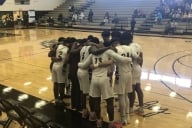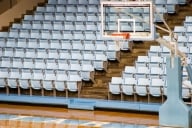You have /5 articles left.
Sign up for a free account or log in.
At least two dozen current and former employees at the University of North Carolina at Chapel Hill were implicated in last week’s report detailing academic fraud at the university.
The extent of their knowledge and involvement in the scandal varies, with some employees just having a basic idea that the courses -- all "paper classes" within the African and Afro-American studies department -- were suspiciously easy. Others, the report alleged, knowingly steered about 1,500 athletes toward no-show courses that never met, were not taught by any faculty members, and where the only work required was a single research paper that received a high grade no matter the content. Nine of these employees have so far been fired or otherwise disciplined by UNC, and several others have since retired.
But a handful of tutors, advisers, and coaching staff members have taken jobs elsewhere, and it remains unclear if they will face any sanctions for their roles in the scandal or for their unwillingness to speak to investigators.
Some of the former employees mentioned in the report for their actions or failing to cooperate with investigators left higher education before news of the misconduct broke -- one works in animal care and another is the head coach of the Indianapolis Colts -- but others are still working on college campuses. Cynthia Reynolds, the former associate director of the Academic Support Program for Student Athletics, is now the academic programs administrator for Cornell University’s School of Applied and Engineering Physics. Everett Withers, a former assistant coach and later interim head football coach at UNC, is now the head football coach at James Madison University.
Neither agreed to be interviewed for the report, investigators said. Reynolds threatened to call the police and report the investigators for harassment, the report stated. In an email sent to the investigators, Withers's agent denied that the coach was being uncooperative, but said that the investigators' demeanor was "arrogant" and "off-putting," and that Withers was not obligated to speak with them. In an earlier email, Withers said that his time at UNC was "a very negative and attacking experience" for football players and the coaching staff. "Therefore, since my dismissal as [head football coach]," Withers wrote, "I have moved on and do not want to 'Go Back' to that time."
Both Reynolds and Withers did not respond to requests for comment for this article.
Kenneth Wainstein, former general counsel of the Federal Bureau of Investigation and leader of the UNC investigation, said that without an interview, the extent of Withers’s knowledge of the “paper classes” is still unclear. Reynolds, however, figures heavily in the report. Investigators were able to piece together her alleged involvement through obtaining emails and other documents she authored during her time as ASPSA’s associate director.
Every semester, the report said, Reynolds would send a list of football players who needed to enroll in paper classes to Deborah Crowder, an administrator in the department and the scheme's architect.
“In some cases, [Reynolds] apparently even indicated for Crowder the grade or grade range the player would need to earn in the class to maintain eligibility,” the report stated.
When Crowder was nearing retirement in 2009, Reynolds allegedly sent an email to a football operations coordinator stressing the importance of players turning in that session’s papers on time so that Crowder would still be the person grading them. Crowder typically assigned As and Bs, the report stated, regardless of the quality of the assignments. “Ms. Crowder is retiring at the end of July,” Reynolds wrote in the email. “If papers are not in, I would expect Ds or Cs at best.”
Given these allegations, the Cornell Daily Sun published an editorial last week urging administrators to conduct their own investigation into Reynolds’ “involvement at UNC and her moral integrity.”
“These bogus courses and fraudulent grading practices clearly violate all four general principles of Cornell’s Code of Academic Conduct, which condemns students gaining an unfair advantage, something Reynolds is accused of facilitating in her role at UNC,” the op-ed stated. “Given her alleged role in this scandal, we at The Sun question her ability to follow our Code of Academic Conduct in her role as an academic administrator.”
This week, Joel Malina, vice president of university relations at Cornell, would not comment on whether the university planned on conducting an investigation of its own. He did address Reynolds's unwillingness to be interviewed by Wainstein and his team, saying that Cornell encouraged her to talk to the investigators but ultimately left the choice up to her.
Reynolds is fully cooperating with the National Collegiate Athletic Association and its separate, ongoing investigation, Malina said, and Cornell will provide paid release time in order for her to do so.
"Cornell University is firmly committed to adherence to the NCAA’s standards of ethical conduct and its standards related to academic eligibility,” he said. “It is important to note that the events in question did not happen at Cornell and Cornell has had no involvement, previously or currently, in the matter."
Gerald Gurney, president of the Drake Group and the former president of the National Association of Academic Advisors for Athletics, said Cornell is “trying to distance itself from happened at UNC,” but that the university may not be able to keep that distance once the NCAA investigation is complete. Cornell may not have a responsibility to launch its own inquiry into Reynolds's time at UNC, Gurney said, but officials would have to react if Reynolds is implicated in the NCAA’s findings.
“It’s important to stress that these are just allegations,” Gurney said. “But they are very serious allegations, so if the NCAA finds that these ethical violations have occurred it is likely to levy a sanction on that person. Even if she is a former staff member, she is likely to be named in the violation, which means she would probably not just receive a penalty but also a show-cause order.”
In the NCAA, a show-cause order is a penalty that orders any sanctions imposed on an individual to remain in effect even if he or she goes to work a different institution. A college may hire an employee who is under a five-year show-cause order before those five years are up, but the penalties imposed on that individual -- probation or public censure, for example -- could transfer to that college.
It’s often used to effectively blacklist a coach after major violations, but it is not limited to members of the coaching staff. In 2009, an academic adviser and a learning specialist at Florida State University received show-cause orders of five and four years, respectively, after an academic fraud scandal there.
James Madison would also encounter the penalties of a show-cause order, perhaps even more so, if Withers is implicated in an NCAA investigation. For now, the university is standing by its coach. In a statement, Jeff Bourne, athletics director at James Madison, said “background checks and additional character research” during Withers' hiring process has left the university confident about the coach’s integrity.
“We are assured of Everett’s leadership and character as displayed through his daily work on our campus and with the young men in our program,” Bourne stated.








